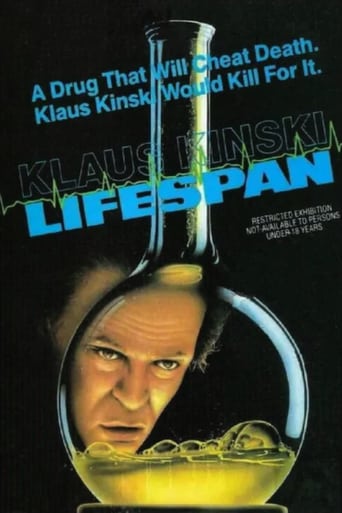nocheblanche
Lifespan is a paced euro movie that sets your brain thinking after you have watched the end credits. Shot in the Netherlands with some very nice location shooting locations , perhaps because i live in Europe and know Amsterdam a bit i can relate to the film more.
Director Sandy Whitelaw seems with this movie offers Klaus Kinski in a more solid more relaxed part playing the Swiss Man with that European style himself asking and wanting and is prepared to pay for it.
This movie has a fresh brisk pace rather like a Autumn morning in Amsterdam Centrum.
Vivekmaru45
This story is beautifully told and is seen through the eyes of an American doctor Ben Land (Hiram Keller). He travels to Amsterdam to attend a convention on the topic of aging and the lifespan of man. There he sees the celebrated Dr. Linden, an expert on aging who is supposedly close to a breakthrough.Having forgotten to extend his hotel reservation, Ben finds himself stranded without a place of accommodation. He is helped by Dr. Linden who says that he could move in to his rooms the next day and stay as long as he wished. He also said that his landlady is an old friend of his and that he would have no trouble moving in.Having a desire to talk to Linden the next day, Land inquires whether he would be available. Linden gives a passing remark that he would be "tied up the next day" and calmly walks off without a word.The next day he is greeted by the landlady who remarks on the youthful appearance of Ben. Then he is lead to Linden's quarters. On opening the door they are witness to a gruesome scene: Dr. Linden is found hanging from a rope hooked to the ceiling-beam. What was the reason that caused Linden to hand himself? And what of his secretive research into the process of aging? Had he achieved a success with his experiments?These are the things you will find out when you seen the film to its eventual end.This film shows some erotic scenes and is therefore not suitable for children.The film also stars Klaus Kinski and the beautiful Tina Aumont. The film is directed by Sandy Whitelaw and written by him along with Judith Rascoe and Alva Ruben. The Cinematography is by Eduard van der Enden.Verdict: 10/10. Add it to your DVD collection.
MARIO GAUCI
Despite the rather lethargic pace, this is an absorbing conspiracy thriller on an existentialist theme. As it was shot in English, even if most of the voices were eventually re-dubbed at a later stage, Fons Rademakers' heavy accent makes his dialogue hard to understand at times! Anyway, many have found Hiram Keller's inexpressive performance a detriment to the film but I rather liked it (and so, apparently, does director Whitelaw!); the fact that a lot of the exposition is imparted through narration has been criticized as well, but I also thought this worked very well for the film. Much has also been said about the notorious (and oft-censored) bondage scene involving Tina Aumont (well cast here): actually, it's very discreetly done and pretty short in itself! And though Klaus Kinski doesn't get to exert his acting muscles a great deal, his Mephistophelean presence adds to the film's uniquely disquieting aura. Besides, the Amsterdam setting (and Eddy van der Enden's lugubrious photography of it) is a big plus, as is Terry Riley's electronic score.Whitelaw's rather choppily edited interview and full-length Audio Commentary (moderated by Mondo Macabro's Peter Tombs) are very interesting: the director explains several points which may not have been very clear and draws attention to the irony which is present in his script. Besides recounting many an amusing anecdote about the production (Kinski turning up on set dressed as a Mexican bandit and Whitelaw having to calmly persuade him that his role of "The Swiss Man" was somewhat different!; Kinski's minimal dialogue was also the result of his dislike of the script, whereupon whole chunks of lines he was supposed to say were unceremoniously thrown out!) and the censorship problems the film encountered (the director tried to convince the U.K. censors that the bondage scene was relevant to the main theme by arguing that this kinky act highlighted a woman's breasts which, by storing milk, are themselves a symbol of immortality!). Whitelaw also puts the unresolved and apparently downbeat ending in the context of the film's theme by saying that a picture about immortality, i.e. the desire that one's life doesn't come to an end, could never have a conventional finish as that would mean it was actually embracing death! Interestingly, he mentions too that Roman Polanski (who was a member of the jury where LIFESPAN won an award) had admired the picture a lot - and this was eventually reflected in his own next film, THE TENANT (1976), to which it bears a striking resemblance plot-wise (though itself based on a work of fiction by Roland Topor, of which Whitelaw was completely unaware at the time)!!
Jonny_Numb
As the previous review states, "Lifespan" owes little to the genres of suspense or horror. Instead, it's a brainy, absorbing drama that's rewarding to those who give it a chance. Hiram Keller plays an American scientist picking up on the research of a colleague who committed suicide, and discovers he was on the verge of finding a cure to the aging process. Klaus Kinski is excellent (as always) in a small role as the owner of a sinister pharmaceutical company. The film plays out much like the early works of David Cronenberg (minus the violence and special effects); his fans should appreciate this. The only drawbacks, really, are an ambiguous ending (which actually fits the rest of the film), and the sometimes-corny, self-conscious voice-over narration. 3 stars out of 5.


